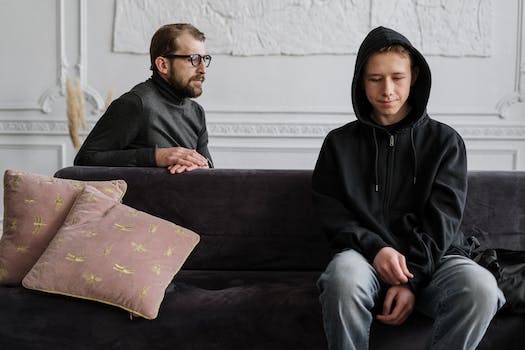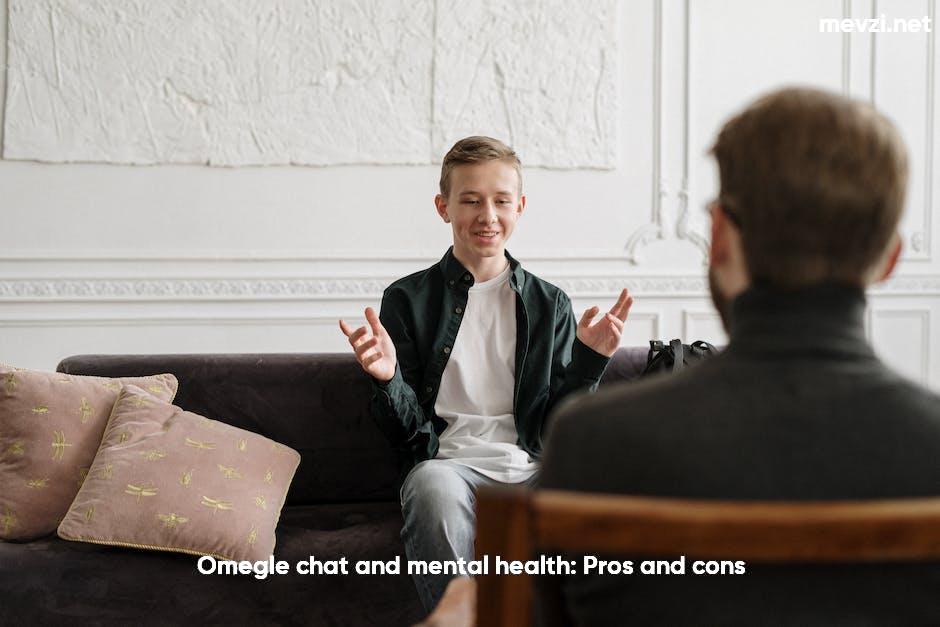Omegle chat is an online platform that allows users to have anonymous conversations with strangers around the world. While it can be an exciting and exhilarating experience to connect with people from different backgrounds, Omegle chat also poses certain pros and cons when it comes to mental health.
One advantage of Omegle chat is that it provides an opportunity for individuals to express themselves freely without any fear of judgment. This can be particularly helpful for those struggling with mental health issues such as anxiety or low self-esteem. The anonymity offered by the platform allows users to open up about their feelings and experiences, providing a sense of relief and validation.
Another positive aspect of Omegle chat is that it can serve as a source of social interaction, especially for those who may feel isolated or lonely. Engaging in conversations with strangers can alleviate feelings of loneliness and provide a sense of connection that may be lacking in a person’s everyday life.
On the other hand, there are several potential drawbacks of Omegle chat that can negatively impact an individual’s mental health. Firstly, the anonymous nature of the platform raises concerns about safety and the potential for encountering inappropriate or harmful content. Users may be exposed to explicit or triggering material that can negatively impact their mental well-being.
Additionally, Omegle chat does not provide any form of verification or moderation, making it easier for individuals with malicious intent to exploit vulnerable users. This can include engaging in cyberbullying or manipulating others emotionally, which can have detrimental effects on the mental health of those targeted.
Furthermore, the lack of accountability and authenticity on Omegle chat can lead to deceptive or dishonest interactions. Users may encounter individuals who portray themselves falsely or engage in manipulative behavior, leading to feelings of confusion, frustration, and distrust.
In conclusion, while Omegle chat can offer a sense of freedom, self-expression, and connection, it also poses potential risks to mental health. It is crucial for users to prioritize their safety and well-being by exercising caution, setting boundaries, and avoiding engaging with individuals who exhibit concerning or harmful behaviors. It may also be beneficial to seek support from mental health professionals or trusted individuals in case negative experiences on Omegle chat arise. 
The Potential Benefits of Using Omegle for Mental Health Support
In today’s fast-paced and interconnected world, technology is playing an increasingly important role in our lives. One area where this is especially true is in the realm of mental health support. Omegle, a popular online platform, offers a unique opportunity for individuals to seek and receive assistance for their mental health concerns. In this article, we will explore the potential benefits of using Omegle as a tool for mental health support.
1. Anonymity and Privacy
One of the key advantages of Omegle is the ability to remain anonymous while seeking support. Many individuals may feel uncomfortable discussing their mental health struggles with friends or family due to stigma or fear of judgment. Omegle eliminates these concerns by providing a safe space where individuals can openly express themselves without revealing their true identity. This anonymity allows for honest and open conversations that can lead to more effective support.
2. Access to a Diverse Community
Another benefit of using Omegle for mental health support is the ability to connect with individuals from diverse backgrounds and experiences. Mental health issues can affect people from all walks of life, and having the opportunity to discuss concerns with others who have similar experiences can provide a sense of validation and understanding. Whether seeking advice, sharing personal stories, or simply venting, the diverse community on Omegle can offer a supportive and non-judgmental environment.
3. A Global Perspective
Omegle is not limited by geographical boundaries, allowing individuals to connect with people from all over the world. This global perspective can be particularly beneficial for individuals living in remote areas or regions with limited mental health resources. By connecting with individuals across borders, users can gain different perspectives, insights, and coping strategies that may not be readily available in their immediate surroundings.
4. Availability and Convenience
Unlike traditional therapy or support groups, Omegle offers 24/7 availability and convenience. Mental health concerns can arise at any time, and having a platform that is accessible around the clock can be crucial for individuals in distress. Whether it’s a late-night anxiety episode or a sudden need for reassurance, Omegle provides a readily available resource for immediate support.
5. An Alternative to Traditional Support Channels
While Omegle should not replace professional help, it can be a valuable complement to traditional support channels. Many individuals may feel more comfortable starting their mental health journey online before seeking face-to-face therapy or support groups. Omegle can serve as a stepping stone, offering an introductory space where individuals can explore their concerns and gather information before seeking out professional help.
- Conclusion
In conclusion, Omegle can be a powerful tool for mental health support, offering anonymity, access to a diverse community, a global perspective, availability, and an alternative to traditional support channels. However, it’s important to note that Omegle should not replace professional help, and individuals should seek professional guidance when necessary. When used responsibly, Omegle has the potential to positively impact individuals’ mental well-being and provide a platform for connection and support.

The Drawbacks of Relying on Omegle for Mental Health Assistance
When it comes to seeking mental health assistance, many individuals turn to online platforms in order to find support and guidance. One such platform that has gained significant popularity is Omegle. However, while it may seem convenient and easily accessible, relying solely on Omegle for mental health assistance comes with a number of drawbacks and potential risks.
First and foremost, it is important to recognize that Omegle is not a professional mental health service. The individuals you may encounter on this platform are not trained therapists or counselors. Their advice and guidance may be well-intentioned, but it lacks the expertise and qualifications necessary to effectively address your mental health concerns.
Furthermore, Omegle is an anonymous platform where users can chat with strangers. While this anonymity can provide a sense of comfort for some users, it also presents significant risks. You have no way of verifying the credibility or reliability of the person you are chatting with. They may misrepresent their identity or intentions, leading to potential harm or manipulation.
In addition, Omegle lacks the necessary safeguards to protect your personal information. Engaging in conversations on this platform means exposing yourself to potential privacy breaches and identity theft. Your personal details, including your mental health struggles, could be stored, shared, or even used against you in harmful ways.
- Lack of Professional Guidance: The individuals on Omegle are not professionals and therefore, their advice may be inaccurate or potentially harmful.
- Anonymity and Potential Risks: While anonymity can be comforting, it also breeds uncertainty and exposes users to potential harm or manipulation.
- Privacy and Security Concerns: Omegle lacks proper safeguards to protect your personal information, leaving you vulnerable to privacy breaches and identity theft.
It is crucial to prioritize your mental well-being by seeking assistance from qualified professionals. Licensed therapists and counselors have the knowledge and experience to offer personalized and evidence-based support tailored to your specific needs. They are equipped to understand and address complex mental health concerns professionally and safely.
In conclusion, while Omegle may initially appear as a convenient option for seeking mental health assistance, its drawbacks and potential risks outweigh any perceived benefits. It is essential to prioritize your mental health by seeking help from qualified professionals who can provide appropriate guidance and support. Remember, your well-being deserves the expertise and care that only trained professionals can offer.

How Omegle chat can affect mental health positively
In today’s digital age, social media platforms have become an integral part of our lives. Communication with others, both near and far, has never been easier. One such platform that has gained immense popularity is Omegle chat. While Omegle chat is known for its anonymous nature, it surprisingly has a positive impact on mental health.
First and foremost, Omegle chat provides individuals with an outlet to express themselves freely. With the anonymity it offers, users feel more comfortable sharing their thoughts, emotions, and experiences without the fear of judgment. This sense of liberation plays a significant role in relieving stress and anxiety.
Moreover, Omegle chat serves as a platform for forming connections with people from diverse backgrounds. It allows individuals to interact with others who they might never come across in their daily lives. These connections not only broaden one’s perspective but also foster a sense of belonging and community. Such interactions have proven to be instrumental in combating feelings of loneliness and isolation.
Furthermore, Omegle chat can be utilized as a valuable tool for practicing social skills. For individuals who struggle with face-to-face interactions, Omegle chat provides a safe space to enhance their communication abilities. Through regular conversations with strangers, individuals can gain confidence and improve their conversational skills, ultimately benefiting their overall mental well-being.
| Benefits of Omegle chat for mental health: |
|---|
| 1. Stress relief: Anonymity allows for open expression and a sense of liberation, reducing stress and anxiety. |
| 2. Broadened perspective: Interacting with individuals from diverse backgrounds fosters a sense of belonging and combats loneliness. |
| 3. Improved social skills: Regular conversations on Omegle chat can enhance communication abilities and boost self-confidence. |
In conclusion, Omegle chat, despite its anonymous nature, has a positive impact on mental health. It serves as a platform for individuals to freely express themselves, connect with diverse individuals, and practice social skills. With its numerous benefits, Omegle chat can contribute to improved mental well-being and overall happiness. So, why not give it a try and experience the positive effects yourself?

The potential risks of using Omegle for mental health guidance
In the digital age, seeking guidance for mental health issues has become more convenient than ever. With the emergence of online platforms, individuals can now connect with professionals and others experiencing similar struggles from the comfort of their own homes. One such platform is Omegle, an online chat room that allows users to engage in anonymous conversations with strangers. While Omegle may seem like a harmless way to seek support, it is essential to be aware of the potential risks associated with this platform.
One of the primary concerns when using Omegle for mental health guidance is the lack of qualifications and expertise of the individuals you may encounter. Unlike licensed therapists or counselors, the strangers you chat with on Omegle may not have the necessary knowledge or training to provide appropriate guidance. Relying on unqualified advice can potentially worsen your mental health issues and lead to harmful consequences.
Furthermore, the anonymous nature of Omegle can pose a threat to your privacy and safety. While the platform claims to monitor conversations to prevent inappropriate content, there is no guarantee that your personal information or conversation details will remain confidential. Sharing sensitive information with strangers puts you at risk of identity theft, blackmail, or emotional manipulation. It is crucial to prioritize your safety and protect your privacy when seeking support online.
- Another risk associated with using Omegle for mental health guidance is the potential for encountering malicious individuals. The platform attracts a wide range of users, including trolls, scammers, and individuals with harmful intentions. Engaging in conversation with such individuals can be emotionally distressing and counterproductive to your mental health goals.
- Additionally, the lack of accountability on Omegle can lead to unreliable and inconsistent support. There are no mechanisms in place to ensure the accuracy or reliability of the information shared by users. Relying on unverified advice can lead to confusion and make it difficult to navigate your mental health journey effectively.
- Lastly, the absence of a professional therapeutic setting on Omegle means that you may miss out on essential therapeutic techniques and interventions. Licensed therapists undergo extensive training to provide evidence-based treatments and interventions tailored to each individual’s needs. Engaging in anonymous conversations with strangers cannot replace the personalized support and guidance offered by qualified professionals.
In conclusion, while Omegle may provide a convenient platform for seeking mental health guidance, it is crucial to be aware of the potential risks involved. From unqualified advice to privacy concerns and encountering malicious individuals, using Omegle for mental health support can do more harm than good. It is essential to prioritize your safety, privacy, and access professional help when needed. Seeking guidance from licensed therapists or reputable mental health platforms ensures that you receive appropriate and evidence-based support to address your mental health needs.

Tips for using Omegle in a responsible and beneficial way for mental health purposes
Omegle is a popular online platform that allows users to connect with strangers from all around the world. While it can be an exciting way to meet new people and have interesting conversations, it is important to use Omegle responsibly, especially when it comes to mental health. In this article, we will discuss some tips to ensure a positive and beneficial experience while using Omegle.
First and foremost, it is crucial to prioritize your mental well-being while using Omegle. Remember that you have full control over your online interactions and should never feel pressured to engage in conversations that make you uncomfortable or stressed. If at any point you start feeling overwhelmed, take a break and prioritize self-care.
When starting a conversation on Omegle, it can be helpful to set clear intentions. If you’re seeking a friendly chat, consider using tags like “friendly conversation” or “casual talk” to attract like-minded individuals. On the other hand, if you’re interested in discussing mental health topics specifically, using tags related to mental health can help you find individuals who share similar interests.
While using Omegle, it’s important to remain mindful of the information you share with strangers. Avoid revealing personal details like your full name, address, or phone number. Protecting your privacy is essential for your own safety and security.
Another tip for a positive Omegle experience is to engage in meaningful conversations. Instead of small talk, try to have discussions that bring value and depth. If you’re interested in mental health and well-being, consider asking open-ended questions about mindfulness, self-care, or coping mechanisms. By focusing on meaningful conversations, you are more likely to have a beneficial experience.
- Be respectful towards others: Treat others with kindness and respect, just as you would in any other social interaction. Avoid using offensive language or engaging in harmful behavior.
- Report and block users if necessary: If someone is behaving inappropriately or making you feel uncomfortable, don’t hesitate to report and block them. Your safety should always be a priority.
- Set boundaries: It’s important to establish your boundaries and communicate them clearly. If you feel uncomfortable discussing certain topics or if a conversation becomes too intense, kindly express your need to change the subject or end the conversation.
- Reach out for professional help when needed: While Omegle can provide a platform for support and connections, it is not a substitute for professional mental health services. If you are struggling with mental health issues, it’s important to seek help from qualified professionals.
In conclusion, using Omegle in a responsible and beneficial way for mental health purposes requires mindful engagement, setting boundaries, and prioritizing your well-being. By taking these tips into consideration, you can have a positive experience while using this online platform and potentially make meaningful connections. Remember, your mental health should always be a priority, both online and offline.
Frequently Asked Questions
What is Omegle chat?
Omegle chat is an online platform that allows users to connect with random strangers for text or video chat.
Is Omegle chat safe for mental health?
Omegle chat can be both beneficial and harmful to mental health. It depends on the user’s experience and how they handle interactions.
What are the potential pros of using Omegle chat for mental health?
Some potential pros include finding support, connecting with like-minded individuals, and having an outlet to express feelings.
What are the potential cons of using Omegle chat for mental health?
Some potential cons include encountering cyberbullying, inappropriate content, and triggering or negative interactions that can worsen mental health.
How can I use Omegle chat responsibly for my mental health?
It is important to set boundaries, avoid sharing personal information, and disengage from any negative or triggering interactions. If necessary, seeking professional support is encouraged.

